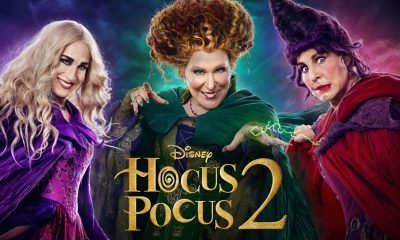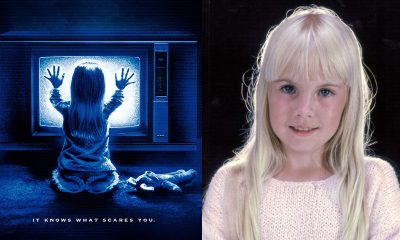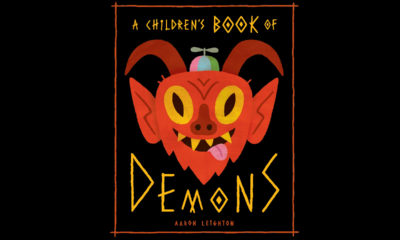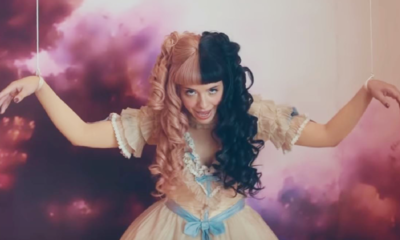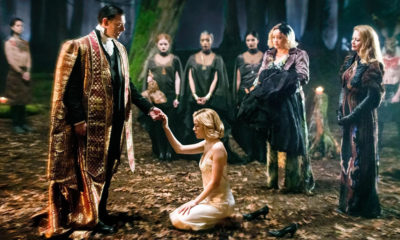Movies and TV
The Absolute Hypocrisy of the Movie “Barbie”
“Barbie” was widely praised by mass media for its “empowering” messages. In reality, the entire movie is steeped in hypocrisy as it actually encourages hate, division, and the manipulation of others. Here’s a look at the insidious messages embedded in this supposed family-friendly movie.
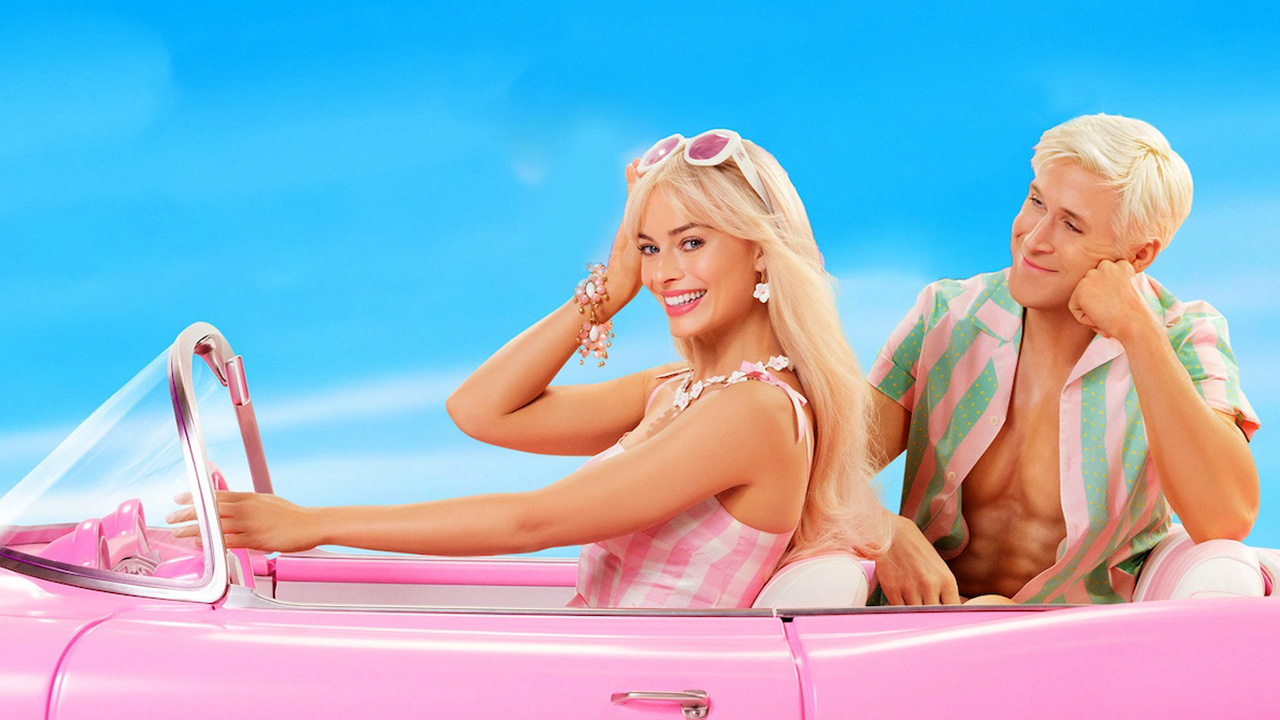
Warning: Brobdingnagian spoilers ahead!
When Barbie came out, it was a cultural phenomenon. Mothers, daughters, sisters, and girlfriends wore pink clothes and gleefully showed up at their local movie theatre to watch their Barbie doll finally come to life.
Then, there was me, a guy. I was wearing a black shirt. The movie clearly wasn’t intended for me but I needed to be there for several reasons. So I sat there and watched how 2023 Hollywood would interpret Barbie and the messages it would convey to the millions of little girls who would be exposed to it.
To say the least, it wasn’t what one would expect. The movie is not about Barbie and Ken having a fun adventure, it is about the patriarchy and a power struggle between the sexes.
While the movie is basically about “girl power”, its portrayal of Barbieland actually highlights how flawed (and even unhinged) modern feminism can be if carried out to its logical conclusion. There are elements of satire that are rather witty and interesting.
However, most of the audience will be children. And they will not get these second-degree jokes. They will absorb the entire thing at face value and that’s where things get rather disturbing. Because, at face value, there’s a strong anti-masculinity theme happening throughout the movie.
For instance, just take a look at the movie poster at the top of this article. Ken is sitting in the backseat of the car. That’s because, in the movie, Barbie doesn’t allow him to sit in the passenger seat (forget about even thinking of driving that car).
This picture is quite symbolic of what would unfold throughout the rest of Barbie.
Oppressive Barbieland
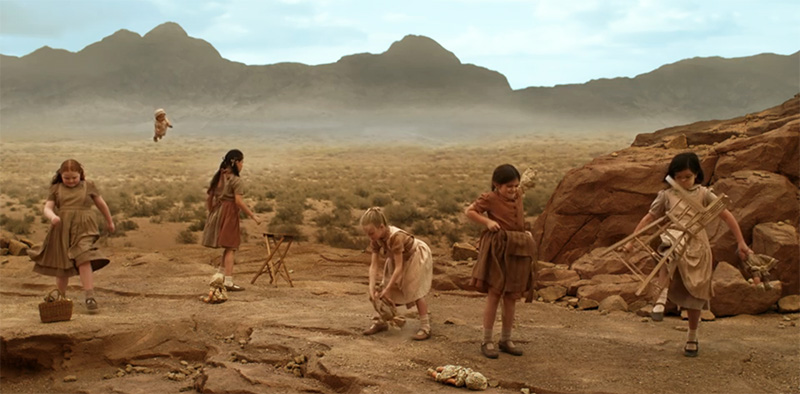
The movie begins with little girls destroying their baby dolls because Barbie taught them that they didn’t need to play mother anymore. The whole concept of motherhood is often ridiculed in the movie.
The narrator says:
“Thanks to Barbie, all problems of feminism and equal rights have been solved.”
As the movie presents us Barbieland, we quickly realize that there are absolutely no equal rights in this place. Quite to the contrary, Barbieland is actually an oppressive regime where Kens are second-class citizens who are openly banned from all positions of power.
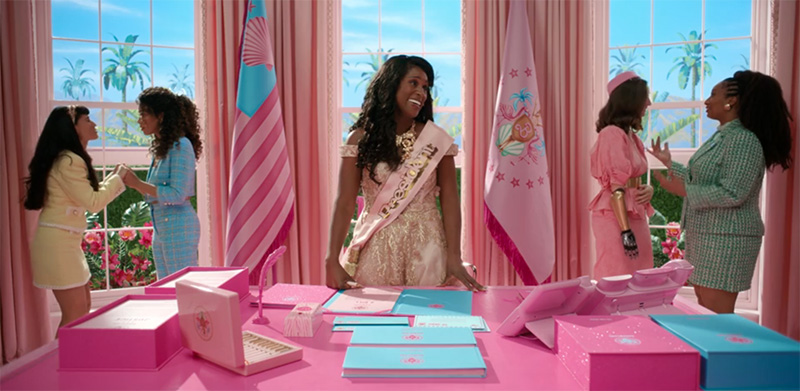
The seat of power of this regime is the Pink House, where there is no man in sight. The American flag was replaced with some weird abomination because the movie actually depicts the United States as a very bad place where women literally can’t. They just can’t.
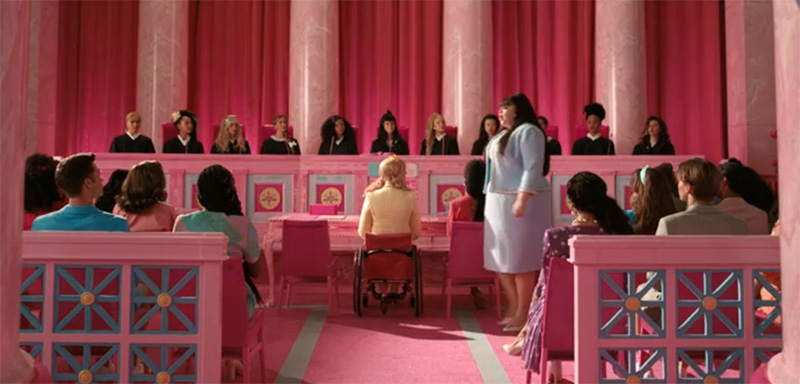
The Supreme Court is 100% women … because men are banned from it. That’s the exact opposite of “equal rights”.
Later in the movie, Barbie says:
“Women hold all major positions of power and control all of the money. Basically, everything that men do in your world, women do in ours.”
With that being said, let’s take a look at the actual Supreme Court of the United States.

Five men and four women.
So is Barbieland’s oppressive regime the result of the Barbie’s flawed interpretation of the real world? Is the movie actually saying that they’re dumb dolls who got carried away? Or is the movie actually normalizing a society where masculinity is shunned?
Speaking of men, in Barbieland, they are badly mistreated. On several occasions, they are blatantly told to shut up. Also, they are severely emasculated – physically and mentally.
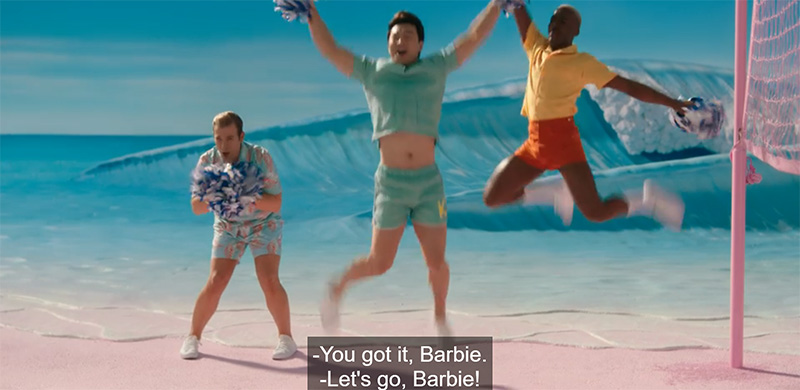
In Barbieland, men cannot partake in sports. They are confined to the sidelines as cheerleaders … very effeminate cheerleaders.
While Barbieland is an openly sexist place, it is presented as a good place. We even hear Lizzo singing the praises of Barbieland at the beginning of the movie. Yes, this Lizzo.

Hypocrisy.
While the men in Barbieland are second-class citizens, one of them is fully accepted by the Barbies: The one who pretends to be a woman.
Transgender Barbie
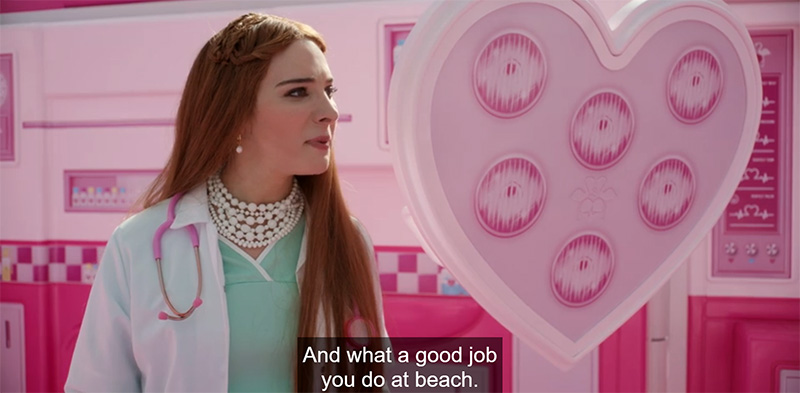
Doctor Barbie is played by a transgender actor.
Among the many hypocrisies in the movie, there’s the fact that a biological male is considered to be an actual woman throughout the movie. Apparently, a man only needs to wear a dress to stop being oppressed in Barbieland. The transgender Barbie is played by Hari Nef, an industry plant who also played in the degenerate series The Idol. Now, he’s in a children’s movie and takes part in all kinds of weird scenarios.
For instance, at one point, Barbie tells Ken that he cannot come to her house because it is “girl’s night”. Then, the camera zooms in on the house.
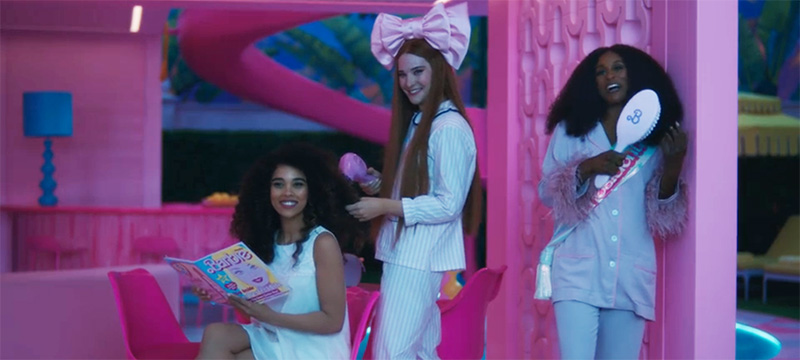
Hari Nef is standing there, chilling with the girls. The movie says one thing with “girl’s night” and immediately shows a man.
Harif Nef doesn’t only stand there in the movie. On several occasions, he gets up close and personal with the Kens, which raises all kinds of questions.
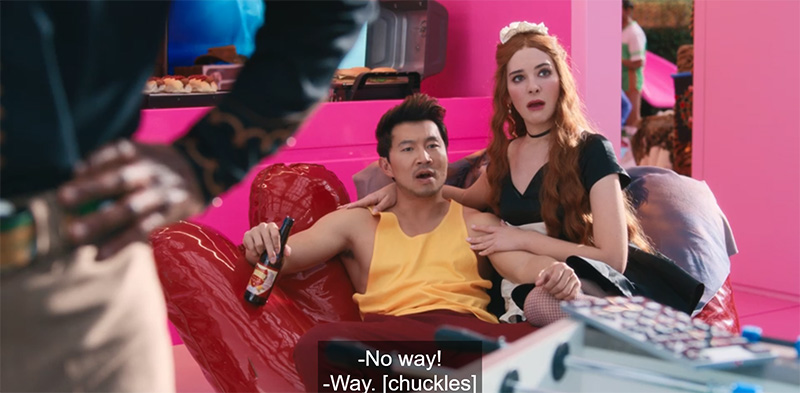
Hari Nef – dressed like a maid – is cozying up with a Ken.
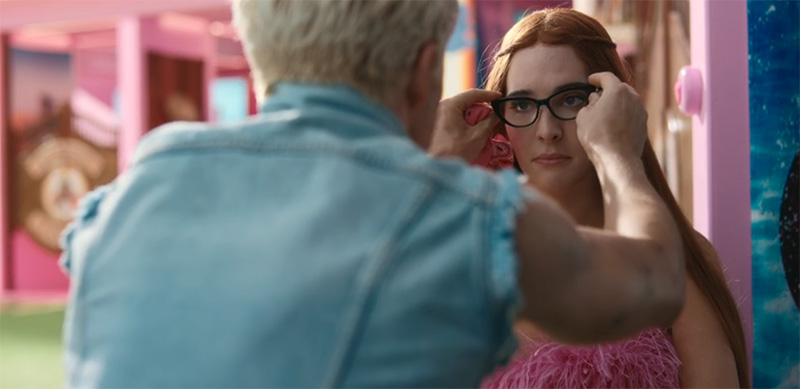
Even the “main Ken” (played by Ryan Gossling) flirts with the Barbie dude by removing his glasses and telling him he’s beautiful.
Were these scenes necessary in a movie aimed at children? Or was it a Hollywood requirement of promoting the gender-blurring agenda?
Pathetic Ken
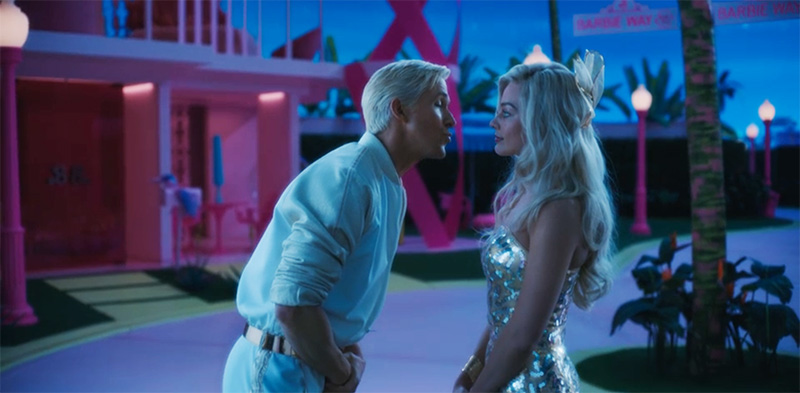
Barbie rejects a kiss from Ken. Spoiler: They will definitely not live happily ever after.
Before the movie came out, the world knew Barbie and Ken as a happy, always smiling couple. Sure, Barbie got most of the attention, but Ken was cool with that. He was just happy looking good while driving their pink cars.
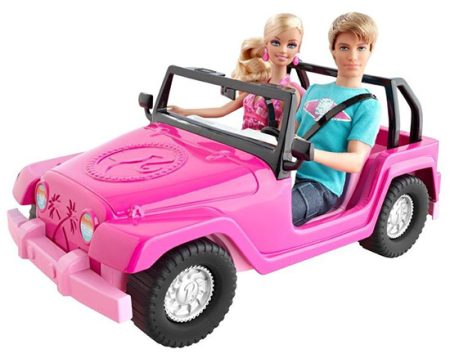
Barbie and Ken toys as sold in stores. Notice how he’s not in the trunk.
However, in the movie, there is no happy couple. At all. Ken is a clingy, jealous, possessive, and insecure idiot who only lives to impress Barbie. In exchange, Barbie talks to Ken as if he was a mentally challenged child. The movie cannot depict a single happy relationship because that would go against its narrative. In Barbie, men and women do not love or complete each other – they are in a perpetual fight for power.
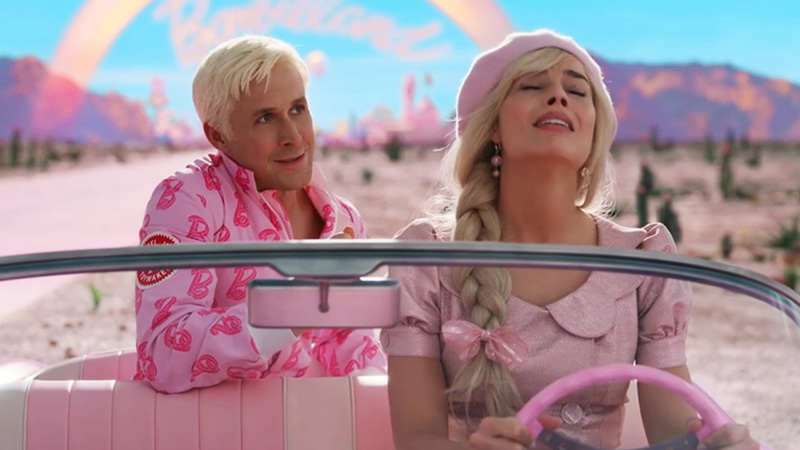
When Barbie drives to the Real World, she discovers that Ken is hidden in the back of the car. And she really did not want him there.
When Ken asks if he can sit in the front, Barbie bluntly answers “No”. ** Cue audience laughter **
But this answer is symbolic. First, it breaks the iconic image of Ken and Barbie driving around together as a happy couple. Furthermore, oppressive regimes such as the Taliban actually force women to sit in the backseat. This doesn’t happen in America but the makers of Barbie apparently think that the Taliban are on to something.
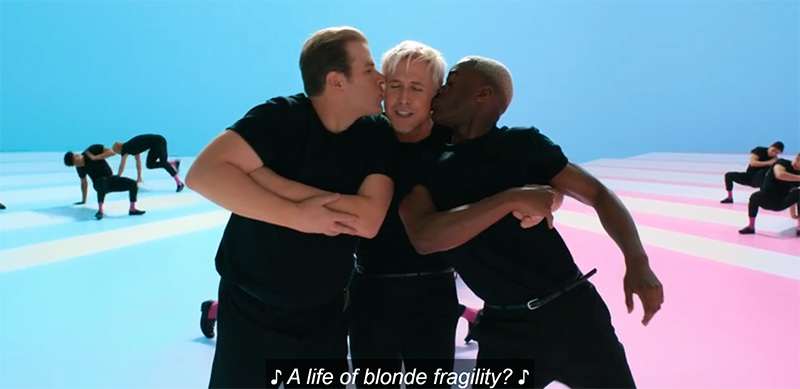
Ken sings about “blonde fragility” while being kissed by two dudes.
The words “blond fragility” are not random. They’re a rather obvious reference to the controversial book White Fragility.
In Barbie, the villains are men in general. Not just one man or a group of men. Just men.
Fighting the Patriarchy
When we first heard about the Barbie movie, most of us probably imagined a fun adventure involving Barbie and Ken. But that’s not what happened at all. The main plot of the movie is literally about fighting the patriarchy. That heavily charged word is constantly used during the movie, to the point that it loses its meaning. The official definition of patriarchy is:
“Social organization marked by the supremacy of the father in the clan or family, the legal dependence of wives and children, and the reckoning of descent and inheritance in the male line.”
– Merriam-Webster
Is America an actual patriarchy? That is very highly debatable. That term probably cannot even apply in a society that is as wide and diverse as the United States.
When Barbie and Ken arrive in the Real World (Los Angeles to be exact), they discover an all-out patriarchy with absolutely no nuance. Ken feels immediately at home while Barbie says that men are looking at her “with an undertone of violence”.

Every single man in Los Angeles aggressively catcalls Barbie, including these stereotypical fratboys. Is there are single normal guy in the Real World? NO.
The movie presents the Real World as a place where it is impossible to be a woman. At one point, America Ferrera gives a long speech where she actually says that it is “literally impossible to be a woman”.
At one point, America says:
“You have to find a way to reject men’s advances without damaging their egos. Because if you say yes to them, you’re a tramp. But if you say no, you’re a prude.”
Did they really need to include this weird bit in a movie intended for children?
Later, the movie has a “reckoning moment” when a schoolgirl shames Barbie for her “shameful” past.
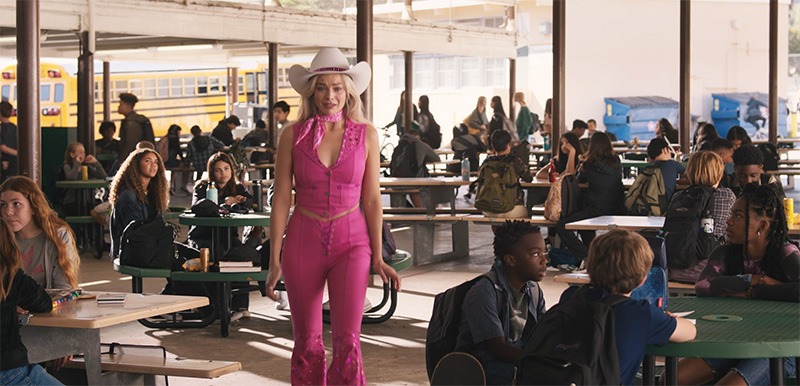
Barbie leaves in tears after a 14-year-old girl roasts her entire existence.
The girl accuses Barbie of “sexualized capitalism” and of “killing the planet with the glorification of rampant consumerism”. She also calls her a fascist.
Mass media critics praised this monologue where the buzzwords “capitalism”, “consumerism” and “killing the planet” were used to let us know that Barbie is woke now.
But, about 3 minutes later, this happens.
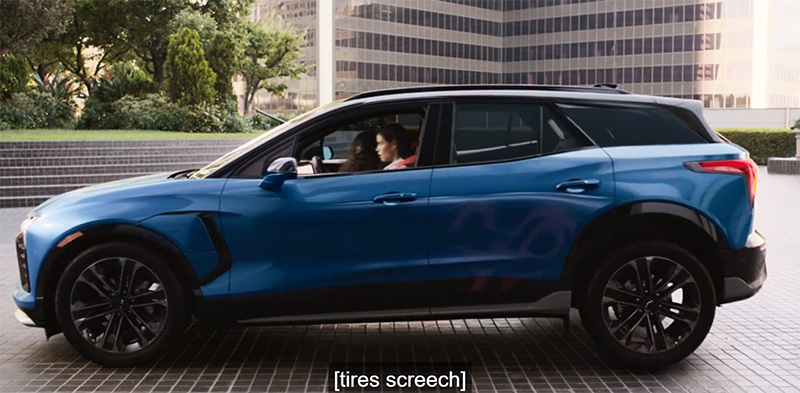
Barbie enters a brand new vehicle which is a clear paid product placement. Then, for a few minutes, the movie turns into a full-on ad for the Chevy Blazer – the ultimate SUV for fighting the patriarchy.
In other words, the movie glorifies “rampant consumerism” while also complaining about it.
Meanwhile, Ken learns about the patriarchy and he’s very happy about it.
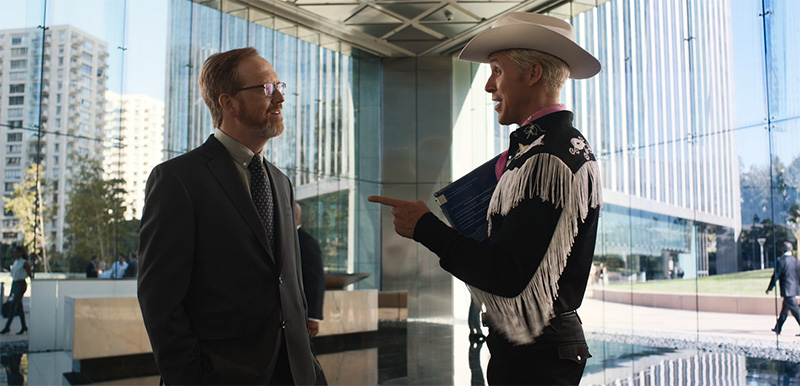
Ken talks with a corporate business guy about men’s stuff.
Here’s the dialogue between the two. Ken says:
– I’ll take a high level, high paying job with influence, please.
– You’ll need at least an MBA and a lot of our people have Phd’s.
– Isn’t being a man enough?
– Actually, right now, it’s kind of the opposite.
– You guys are clearly not doing patriarchy very well.
– No, we’re doing it well. We just hide it better now.
Note: No two men have ever discussed “doing patriarchy”. Ever. However, Ken is a dumb doll. And Barbie hurt his feelings so he imported his version of patriarchy to Barbieland.

When she comes back to Barbieland, Barbie discovers that men are actually **gasp** playing volleyball. The horror.
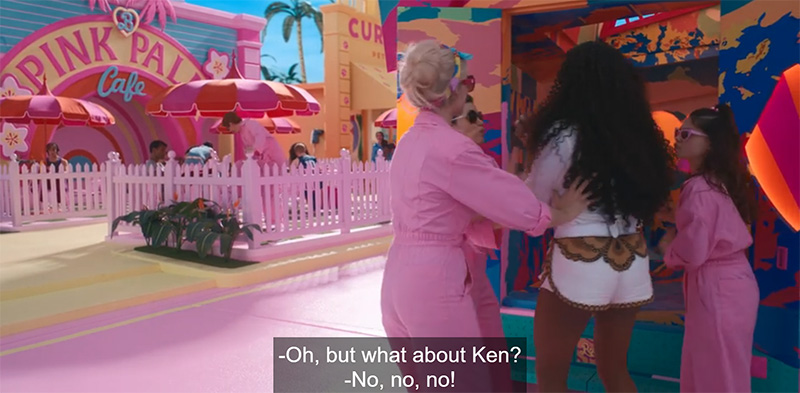
To reverse Ken’s patriarchy, Barbies get abducted into a truck where they are “de-programmed” (or re-programmed) by America Ferrera who talks about how it’s impossible to be a woman.
The final stage of the Barbies’ plan to regain power is just … mean.
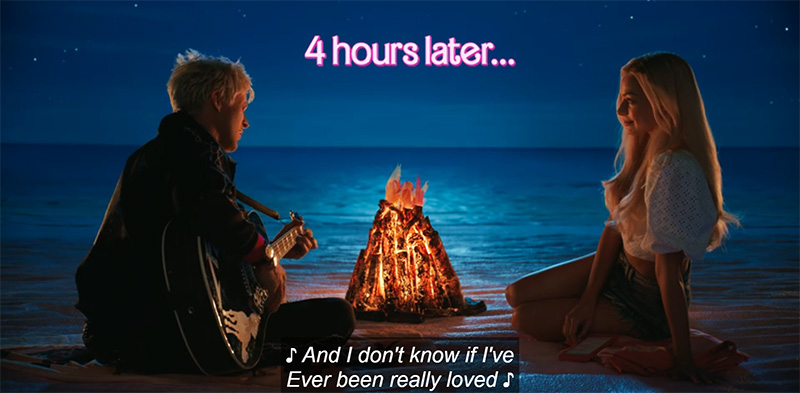
The plan involves giving Kens the love and attention they crave by listening to them sing a song.
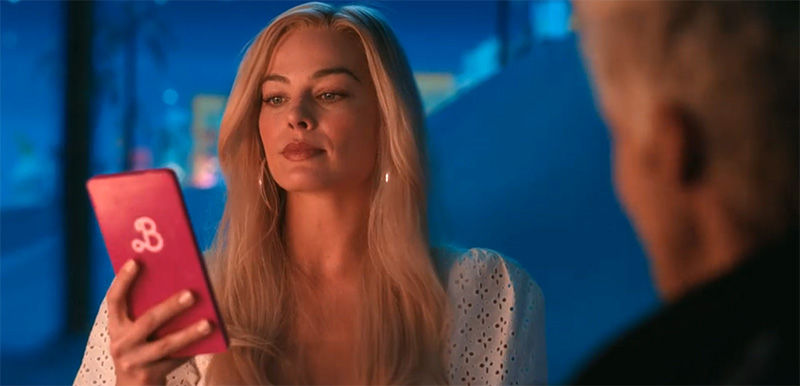
Then they crush their spirit by chatting with another guy and leaving them.
The Barbies say:
“Give them their dream come true. And, at the peak of their happiness, when they think you actually care about this song … you take it all away.”
Does this scene teach little girls to be hypocrites, mean-spirited, and manipulative to obtain what they want?
In the end, the plan works and the Barbie system of oppression is restored. Yay. At one point, a Ken says:
– Madam President. Please may the Kens have one Supreme Court justice?
– I can’t do that.
Yes, the “happy ending” of the movie involves Madam President telling men that they still cannot have a single judge on the Supreme Court.
At the end of the movie, Barbie ascends to a form of godhood.
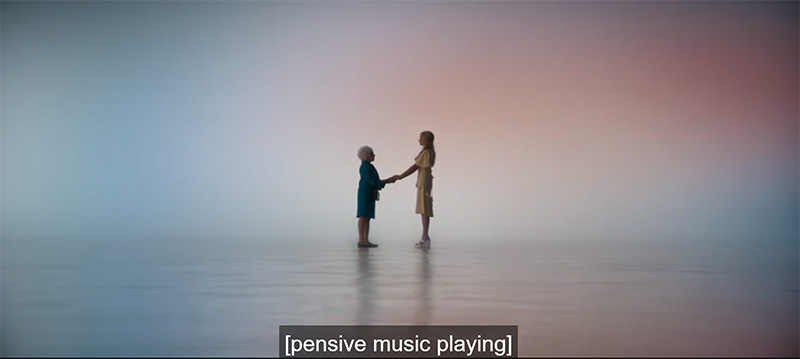
Barbie meets her “creator” and becomes a real woman.
What about Ken? He cried a lot and stayed in Barbieland.
Cue the credits with the song Barbie World by Nicki Minaj featuring Ice Spice. One line from the song:
That pussy so cold, we just chillin’ out.
In Conclusion
Barbie is a feminist movie that also critiques feminism. Barbieland is the result of plastic dolls taking modern-day feminism to its logical conclusion. And it is quite absurd. On the other hand, it actually works. And that’s what most children will take out from the movie. In a way, Barbieland reflects the type of society the elite is trying to impose on the world. They want feeble, insecure, and emasculated men. They want us to believe that there is absolutely no difference between a real woman and a transgender woman. They want a system where it is socially acceptable to exclude people due to their identity. They want a society where a strong, loving nuclear family is non-existent – only a collection of deeply confused individuals.
Barbie doesn’t really know what she wants or who she is while Ken is in a state of complete agony because he doesn’t feel heard or loved. While some will interpret Barbie as a critique of today’s society, most of its young viewers will simply absorb the “values” of Barbieland. Therein lies the underhanded and hypocritical messaging found in Barbie.
- Laser beam able to destroy targets at speed of light is tested from British army vehicle for first time
- New Fountain in Vienna Shows What Ruling Oligarchy Think of Us and Celebrates How They've Warped and Ruined Us
- Cartoon Network 'Mighty Magiswords' creator Kyle Carrozza arrested on child p**n charges
- Biden said this … and then something happened.
- BlackRock linked firm, Austin Private Wealth (APW), shorted Trump stock shortly before shooting.
- They don't even hide anymore …
- Global IT meltdown show perils of cashless society
Get an e-mail notification as soon as a new article is published on The Vigilant Citizen.
-

 Movies and TV2 months ago
Movies and TV2 months agoThe Eurovision 2024 Finale Was Basically a Demonic Ritual
-

 Pics of the Month2 months ago
Pics of the Month2 months agoSymbolic Pics of the Month 05/24
-

 Latest News3 months ago
Latest News3 months agoBeyond Rap Beef: Kendrick Lamar’s Dark Accusations Against Drake (Including Sex Trafficking)
-

 Movies and TV3 months ago
Movies and TV3 months ago“American Horror Story: Delicate” and its Messages About Hollywood’s Occult Underbelly
-

 VC Resources1 month ago
VC Resources1 month agoThe True Meaning of the Inverted Cross and Why Mass Media Lies About It
-

 Latest News3 weeks ago
Latest News3 weeks agoBiden’s Debate Performance Was Shocking Proof That He’s Merely a Puppet. Who Actually Runs the Country?
-

 Latest News2 months ago
Latest News2 months agoBilderberg 2024 or How the Elite Subverts Politics, Technology, Big Pharma and the Media
-

 Movies and TV1 month ago
Movies and TV1 month agoThe Much-Overlooked Symbolism in Roman Polanski’s “The Ninth Gate”






